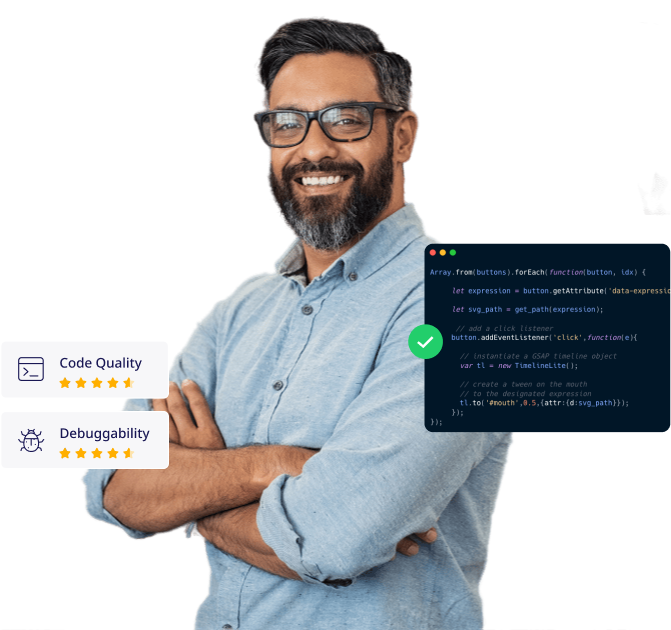Advance your mobile strategy with ValueCoders' iOS experts, crafting bespoke apps using cutting-edge technologies like AR/VR and AI/ML.

Our expert iOS developers/programmers are well-versed with latest trends and technologies. The apps they build aren’t only visually appealing, but adhere to the stringent quality and security standards of Apple.

Our remote iOS application developers build secure apps using technologies such as AR/VR, Blockchain, AI/ML, etc.
We offer comprehensive consultancy services to help you make the right decisions while developing your iOS app.
Our full-stack iOS application developers are prompt in re-engineering iOS apps and enhancing features accordingly.
Our remote iPhone app developers keep your iOS application updated for a better user experience.
Our iOS developers have expertise in performing maintenance tasks and help you improve your app's performance.
Our team of experienced QA testers tests your iOS app against various criteria to ensure a glitch-free experience for the users.
Don’t just limit to a single operating system as it can hamper your project's success, instead, take the best Hybrid iPhone App Development services.
Obtain exceptional Apple Watch App Development services to expand your app's reach and offer your users more ways to interact.
Empower your customers to access your app through a powerful M-commerce application to take it to the next level.
Start your 7-day trial today and discover the perfect fit for your project needs.
Our top iOS development services in India ensure staying abreast with the latest iOS technology to build scalable, secure apps for clients in diverse industry verticals.

Hire our skilled developers and lead the way to innovation.
At the core of our development process, we prioritize code quality, implementing stringent testing, detailed reviews, and industry-best practices to deliver software that excels in both functionality and longevity.

Hire iOS app developers in India from ValueCoders to build & deploy apps that excel in functional design, code performance, scalability, and security. These also deliver an engaging user experience. Here are a few more reasons to hire iOS app developers from ValueCoders.
From startups to big enterprises, development
From startups to big enterprises, development
From startups to big enterprises, development
From startups to big enterprises, development
From startups to big enterprises, development
From startups to big enterprises, development
From startups to big enterprises, development
From startups to big enterprises, development
Ready to elevate your software projects? Hire our expert developers and experience unparalleled innovation and efficiency.
There are several ways to hire iOS developers for your next project, i.e., In-House, Freelancers, or ValueCoders for your iOS development needs. Here is a quick analysis between all of them-
With a five-step hiring process in place, we are committed to onboarding
exceptionally productive engineers.

Take a look at the simple and straightforward process to hire software developers from ValueCoders.
We assess project alignment for potential collaboration.
We select developers from our tech pool as per project needs.
Upon ETA approval, developers start with direct task assignment.
Modify team size as needed, aided by an account manager.
Hire dedicated iOS app developers and programmers from India, rated among the top 1% of talent globally.
Start your 7-day trial today and discover the perfect fit for your project needs.

Some major benefits of iOS app development include the following:

The primary programming language for iOS app development in Swift. It’s powerful, intuitive, and developed by Apple Inc. Here are some key points about Swift:
While Swift is the primary language, developers may also use Objective-C, C++, or HTML5/JavaScript frameworks like React Native or Ionic for specific purposes. The choice depends on project goals and platform compatibility needs.

IOS development is one of technology’s most in-demand and fastest-growing fields. Some top roles hiring for iOS developers include software engineer, mobile developer, Swift Developer, and iPhone Developer.
The popularity and demand for developing apps for iPhones and iPads have grown exponentially ever since. As companies increasingly look to build out their mobile presence with customized applications and features tailored to users’ devices, there’s an increasing need for skilled iPhone application developers who can optimize user experience by creating unique solutions that are reliable and secure.
In addition to iPhone/iPad app development skills, employers often look for other experiences, such as
Furthermore, more specialist skills such as 3D printing technologies & wearable integrations are also gaining much traction within this field lately, adding further value to experienced engineers working in this domain at the present time.
Overall market trends suggest that businesses are continuously investing more resources into developing their own application platforms & ecosystems around them.

Ans. It’s important to carefully evaluate potential candidates based on their skills, experience, and fit with your company’s culture and needs. You may also want to consider working with an experienced iOS developer on a contract basis before committing to hiring them full-time.
There are several ways you can hire an iOS programmer/developer:

Hiring iOS app developers for your project offers several advantages over relying on in-house development:
By hiring iOS app developers, you can leverage their expertise, save time and costs, access the latest technologies, and focus on your core competencies while ensuring the development of a high-quality iOS app tailored to your specific requirements.

When hiring iOS app developers, looking for specific skills and expertise is important to ensure you find the right professionals for your project. Here are key skills and expertise to consider:
By considering these skills and expertise when hiring iOS app developers, you increase the likelihood of finding competent professionals who can contribute to the success of your iOS app development project.

Effectively managing and collaborating with hired iOS app developers throughout the development lifecycle involves implementing best practices and strategies. Here are some key approaches to consider:

When hiring iOS app developers, it’s important to be aware of potential risks or challenges and take steps to mitigate them for a successful project. Here are some common risks and suggested mitigation strategies:
Here are answers to some questions about hiring iOS developers or iOS technology that our clients frequently ask.
Ans. Here are a few reasons to hire dedicated iOS developers from ValueCoders:
Experienced Professionals: ValueCoders boasts a team of highly skilled and experienced professionals in various technologies and frameworks.
Flexible Hiring Models: Offers various hiring models (full-time, part-time, project-based) to suit different project requirements and budgets.
Timely Delivery: Adheres to strict timelines, ensuring projects are delivered on schedule without compromising quality.
Post-Deployment Support: Ensures robust post-deployment support, including maintenance and updates to keep applications running smoothly.
Technological Expertise: Keeps up with the latest technological advancements to deliver innovative and cutting-edge solutions.
Ans. Yes, our iOS developers are skilled communicators who can understand your requirements and work with you closely throughout the development process. We use various communication channels like email, Skype, and Slack to keep you updated on the project’s progress and ensure smooth collaboration.
Ans. Yes, you will have complete control over the hired developers as a client. You can communicate with them directly, assign tasks, monitor their progress, and make changes as per your requirements. Our developers work dedicatedly on your project and follow agile development methodologies to ensure your project’s efficient and timely delivery.
Ans. Yes, our iOS developers are equipped to manage the entire app development lifecycle, from concept to deployment, including planning, design, development, testing, and maintenance.
Ans. We offer comprehensive post-deployment support which includes bug fixes, performance optimization, updates, and feature enhancements to ensure the smooth functioning of the iOS application.
We are grateful for our clients’ trust in us, and we take great pride in delivering quality solutions that exceed their expectations. Here is what some of them have to say about us:

Co-founder, Miracle Choice

Executive Director

Director

Director
We offer a 2 weeks risk-free trial for you to try out the resource(s) before onboarding. After 2 weeks, if you like the resource(s), you pay for the time and continue on. Else, we replace the aligned resource(s) or cancel the trial as per your wish.
Simple, transparent and easy - isn't it?
Start my 2 week risk-free trial now!Trusted by Startups and Fortune 500 companies
We can handle projects of all complexities.
Startups to Fortune 500, we have worked with all.
Top 1% industry talent to ensure your digital success.



Let's discuss how we can bring your vision to life.